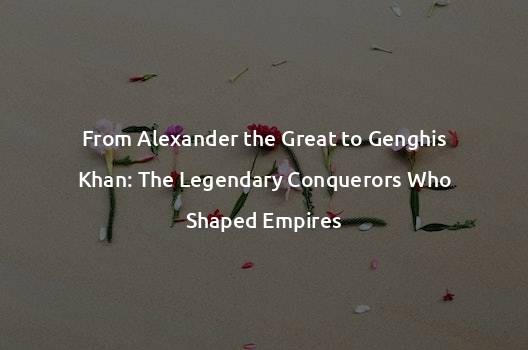From Alexander the Great to Genghis Khan: The Legendary Conquerors Who Shaped Empires
Alexander the Great: The Conqueror of the Ancient World
Alexander III of Macedon, also known as Alexander the Great, was one of the most exceptional military leaders in history. Born in 356 BC, he inherited the throne of Macedonia at the age of 20 after the assassination of his father, King Philip II. Alexander quickly proved his prowess as a military strategist, embarking on a series of military campaigns that would reshape the known world.
With a well-trained army at his disposal, Alexander embarked on an ambitious plan to conquer the vast Persian Empire. In 334 BC, he led his troops across the Hellespont into Asia Minor, defeating the Persian forces in the Battle of Granicus. From there, he continued to push eastward, defeating the Persian King Darius III in key battles such as Issus and Gaugamela.
Alexander’s military genius was matched by his ability to inspire loyalty among his troops. His men adored him, and he knew how to motivate them to achieve great things. Together, they marched through the deserts of Egypt, crossed the mountains of India, and even encountered elephants on the battlefield.
After a decade of relentless warfare, Alexander’s empire stretched from Greece to Egypt, Persia, and as far as India. He founded numerous cities, many of which bore his name, and his conquests led to the spread of Hellenistic culture throughout the ancient world.
Genghis Khan: The Fearless Mongol Warrior
Genghis Khan, born as Temujin in 1162, was the founder and emperor of the Mongol Empire. Growing up in a nomadic society on the Asian steppe, Genghis Khan experienced a tough and uncompromising upbringing that fostered his later success as a conqueror. In 1206, he united the Mongol tribes under his leadership and began his quest for conquest.
Known for his military brilliance and tactical ingenuity, Genghis Khan built an army that would strike fear into the hearts of his enemies. His soldiers were disciplined, highly skilled horsemen, and they had perfected the art of archery. They used their mobility and superior cavalry tactics to swiftly overwhelm opposing forces.
Genghis Khan embarked on a series of relentless invasions, conquering vast territories from China to Eastern Europe. His empire expanded at an astonishing rate, crushing enemy armies and sacking cities along the way. The Mongols utilized psychological warfare to demoralize their foes, employing tactics such as feigned retreats and spreading terror among the local population.
Genghis Khan’s realm covered an area larger than any empire in history, stretching from the Pacific Ocean to the Black Sea. His visionary leadership helped foster communication, trade, and cultural exchange along the Silk Road, bringing East and West closer together.
The Legacies of Alexander and Genghis Khan
Alexander the Great and Genghis Khan were two of the most influential conquerors in history. Their military achievements shaped the empires they created and left lasting legacies that are still felt today.
Alexander’s conquests spread Greek culture throughout his empire, known as the Hellenistic period. Greek became the lingua franca of the region, and art, architecture, and philosophy flourished. The cities that Alexander founded, including Alexandria in Egypt, became centers of learning and trade.
Similarly, Genghis Khan’s empire facilitated the exchange of ideas, technologies, and goods between East and West. The Mongols’ control over the Silk Road brought prosperity to the regions they conquered and allowed for the transmission of inventions such as gunpowder and papermaking.
Both conquerors significantly influenced the course of history. Alexander’s empire eventually fragmented into separate Hellenistic kingdoms, which were eventually absorbed by the Roman Empire and later influenced the culture of the Islamic world.
Genghis Khan’s empire, on the other hand, left a lasting impact on the regions it conquered. The Yuan Dynasty in China, founded by Genghis Khan’s grandson, Kublai Khan, endured for almost a century and helped shape China’s future. Additionally, the Mongols laid the groundwork for the rise of the Ottoman Empire, which would become a dominant force in the Islamic world.
TLDR;
Alexander the Great and Genghis Khan were legendary conquerors who left an indelible mark on history. Through their military prowess and visionary leadership, they reshaped empires and facilitated the exchange of ideas and cultures. Alexander’s empire spread Greek culture and fostered intellectual and artistic achievements. Genghis Khan’s empire connected East and West, facilitating trade and technological exchange. Both conquerors shaped the course of history and left legacies that are still felt today.







